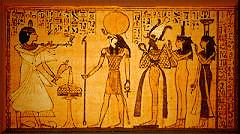Front page - Gods - Egyptian Temples - History of Religion - Priesthood - Rituals - Creation Myths
Per AnkhThe House of Life
Egyptian Gods, their main centers of worship |
|
Heka - Ancient Egyptian 'Magic'
|
The word 'magic' has in the Western world often been described as a form of non-religious practise, used for blasphemous, personal and limited ends. Therefore Egyptologists also have had some difficulties in explaining how 'magic' tied in with ancient Egyptian practises, wether religious or mundane. Ancient Egypt never differed between the mundane and the religious world, so that is not really a problem; to them every aspect of life was connected to the gods, and the word 'religion' did not even exist. The word 'magic' itself came down to us via the Coptic word hik during the Christian period, which equalled to the Greek mageia and the Latin magia, by which was meant illegal sorcery - there we have the root of the problem. The Coptic Hik was developed from the pre-Christian, Pharaonic times hq3, i.e. Heka, which by no means had any illegal or evil connotations. Instead it was a divine force neccessary even for the gods to draw power from. And now we can take a closer look at it: Heka in ancient Egypt depended on four components: Heka - the primeval potency that empowered the creator-god at the beginning of time. In the Coffin Texts, Spell 261, it says that Heka existed: "before duality had yet come into being" Rw - sacred texts. Seshaw - magical rituals or treatments. Pekhret - medicinal prescriptions. Heka acted together with Hu, the principle of Divine Utterance, and Sia (divine omniscience)which all three were necessary for the Kingīs creative powers during the Old Kingdom. Morenz calls this 'the expression of divine creativeness through thought and speech.' This was made visible in the image of the cobra on the Kingīs brow, which could be named Weret-Hekau, 'the Goddess great in Heka-power'. While we of the modern world differ very distinctly between body and soul as well as between prayers, 'magic' and classical medicine, the ancient Egyptians, along with many other cultures existing even today, did not. They regarded it neccessary for all these components to be present and working together if 'magic' was to occur. Heka was both the ancient Egyptian deity Heka and the action of performing Heka. It would perhaps be more correct to call it Life Force in Action. In our modern day the word 'magic' has other connotations than those the ancient Egyptians attached to their word heka. The word was neutral in itself and could be used to direct oneself to the very heart of cult and of creation, with the purpose of regaining the Cosmic Order and Balance when something had gone wrong. So, when used by humans, it was no more and no less a form of ritualized prayer. Several deities were connected to this concept: Weret-Hekau, Great of Magic, was one of the titles of Aset, and the same title was also used for Sekhmet. WordsWords in themselves were regarded as divine, wether written or spoken and were to be treated with great respect. To know the name of something meant to have power over it. This could also mean misusing the power of Heka for selfish or destructive motives. Then imitation of names meant that verbal trickery, such as puns, metaphors and acrostics were regarded as powerful tools for as in many other cultures the method of application was based largely on imitation. The ancient Egyptians believed that the replication of a name, image or mythical event would bring about a desired effect in the real world. Heka in itself was therefore neutral, i.e. neither good nor bad. They never divided Heka in 'black magic' or white magic' as Christian and other cultures did. Neither was the use of Heka culturally limited to only Egyptians; also other people and foreign enemies could use it, though in their own ways. Heka was not only particular to the deity who acted from and with it, humans too have life force and can of course use heka to come into contact with the divine. The ancients believed that with the help of heka they could influence the world of the gods and gain protection, healing and support. As heka was used both in temple ritual and in more informal situations, one sees the possible reason of equating it for "magic". It had, however, nothing to do with evoking spirits or any supernatural phenomena. It was a way of addressing oneself to the Divine in any of Itīs many aspects. Heka and HealingTherefore healing of all kinds of illness were dependent on all of the above mentioned components to be present for it to be effective. In Egyptian texts we understand that Egyptian religious belief and cult practise were closely interwoven with medical practice. These practices were indivisibly combined with religious rituals in ancient Egypt, bringing about a wholly integrated therapy/treatment. |
Some sources:
The Ancient Egyptian Pyramid Texts - transl. R.O Faulkner
The Ancient Egyptian Coffin Texts - transl. R.O Foulkner
The Book of Going Forth By Day - transl: T.G. Allen
Egyptian Religion - Siegfried Morenz
Development of Religion and Thought in Ancient Egypt - James H. Breasted
Ich Bin Isis - Jan Bergman
Copyright 1998 - 2005. All Rights Reserved.
These pages are for education only.
Contact:

Front page - Gods - Egyptian Temples - History of Religion - Priesthood - Rituals - Creation Myths